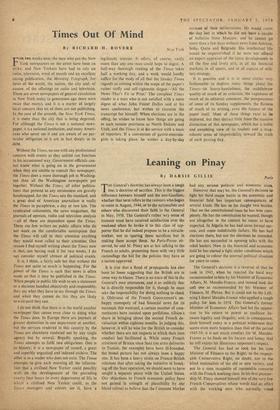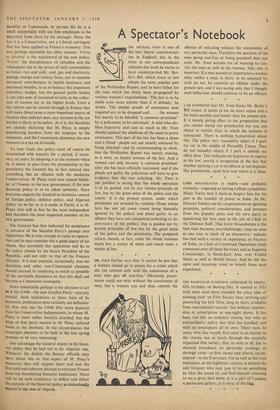Leaning on Pinay
By DARSIE GILLIE Paris
THE General's doctrine has always been a tough one, a doctrine of sacrifice. This is the biggest difference between himself and the neo-Gaullists, whether that term refers to the resisters who began to resist in August, 1944, or to the nationalists and others who discovered their faith in the General in May, 1958. The General's rather wry sense of humour must have received satisfaction over the weekend when be broke it to this class of sup- porter that he did indeed propose to be a miracle- worker, not in sparing them sacrifices but in making them accept them. As Paris-Presse ob- served, he and M. Pinay are at last talking to the French as adults, presenting them with very little camouflage the bill for the policies they have as a nation approved.
It is true that a flood of propaganda has also been let loose suggesting that the British are in some way to blame. There is no trace of this in the General's own utterances, and it as unlikely that he is directly responsible for it, though he must take the responsibility for doing nothing to check it. Oblivious of the French Government's un- happy monopoly of bad financial news for its nationals this weekend, a certain number of com- mentators have insisted upon perfidious Albion's share in bringing about the second French de- valuation within eighteen months. In judging this, however, it will be wise for the British to consider whether there are not respects in which their own conduct has facilitated it. While many French criticisms of Britain since Suez (on arms deliveries to Tunisia, for example) have been ill-founded, the broad picture has not always been a happy one. It has been a heavy strain on Franco-British relations that after taking the initiative in break- ing off the Suez operation, we should seem to have sought a separate peace with the United States. Our objections to French economic policy have not gained in strength or plausibility by our bland refusal to believe that the Common Market had any serious political and economic aims.
However that may be, the General's decision to fight his third major battle in the economic and financial field has important consequences of several kinds. He has so far fought two battles. That on the constitutional issue he has won com- pletely. He has the constitution he wanted, though not altogether in the context he seems to have expected. In Algeria he has had some formal suc- cess, and some indubitable failure. He has had elections there, but not the elections he intended. He has not succeeded in opening talks with the rebel leaders. Now in the financial and economic field he has started a fight under conditions which are going to colour the internal political situation for years to come.
The General's decision is a reversal of that he took in 1945, when he rejected the hard way recommended to him by his Minister of Economic Affairs, M. Mendes-France, and instead took the soft one as recommended by his Minister of Finance, M. Pleven. But it could not be the Left- wing Liberal Mendes-France who applied a tough policy for him in 1958. The General's former Minister of Economic Affairs had led the opposi- tion to his return to power as mediator be- tween legality and illegality, and, in consequence, finds himself today in a political wilderness that seems even more hopeless than that of the period 1945-54; it is not much comfort for M. Mendes- France as he feeds on his locusts and honey that he still enjoys his illustrious opponent's respect.
The General has had to look for his iron Minister of Finance to the Right; to the respect- able Conservative Right, no doubt, not to the blind nationalists of the old or new variety, and not to a man incapable of reasonable converse with the French working class. In his first premier- ship M. Pinay showed himself one of the very few French Conservatives whose words had an effect with the working men who normally voted Socialist or Communist. In private life he is a small industrialist with too few employees to be separated from them by his manager. None the less it is a Conservative, not a Liberal, astringent that has been applied to France's economy. This was perhaps inevitable for other reasons. 'Verite et Severite' is the watchword of the new policy. 'Verite,' the abandonment of subsidies and the consequent rise in the prices of such commodities as bread, rice and milk, coal, gas and electricity, postage stamps and railway fares, not to mention increased contributions to health insurance and decreased benefits, so as to balance this important subsidiary budget, hits the general public before it can take note of increased severity in the collec- tion of income tax at the higher levels. Until a tax reform can be carried through in France that will make direct taxes a more important source of revenue than,indirect ones, any increase in the tax burden is likely to be unfair. As it is, the Socialists are already declaring that M. Pinay is simply transferring burdens from the taxpayer to the consumer, and the Communists denounce the new measure as a tax on ill-health.
To bear fruits the policy must of course be maintained with tenacity for a period, if neces- sary, of years. In adopting it at the moment when he is about to pass from the premiership to the presidency the General has in fact entered into something like an alliance with the moderate Conservatives. M. Pinay must now remain Minis- ter of Finance in the new government, if the new financial policy is to be taken seriously. Since everyone expects the General to maintain control of foreign policy, defence policy, and Algerian policy (in so far as it is made in Paris), it is M. Pinay who will in fact be the most independent and therefore the most important member of the new government.
The General has thus indicated his acceptance in advance of the Socialist Party's passage into opposition. He is wise enough to value an opposi- tion and he may consider this a good aspect of his choice. But inevitably the opposition will be to the policy chosen by the future President of the Republic, and not only to that of the Finance Minister. It is now essential, incidentally, that the Socialists and other non-Communist elements should succeed in canalising as much as possible of the inevitable discontent so that this shall not become a Communist monopoly.
More remarkable perhaps is his decision to act as if the UNR—the new Gaullist Party—scarcely existed. Such indications as there were of its economic preferences were certainly not deflation- ist. Not only has the UNR fifty more deputies than the Conservative Independents, to whom M. Pinay is (now rather loosely) attached, but the wing of that party nearest to M. Piney suffered losses in the elections. In the circumstances the municipal elections to be held in the late spring promise to be very interesting.
One advantage the General enjoys in his finan- cial policy that he had not in his Algerian one. Whatever the doubts the finance officials may have about this or that aspect of M. Pinay's measures, they will support heart and soul the first bold and coherent attempt to extricate France from her humiliating financial weaknesses. There will be no such conspiracy to deflect and defeat the purpose of the financial policy as undoubtedly existed in the case of Algeria.











































 Previous page
Previous page